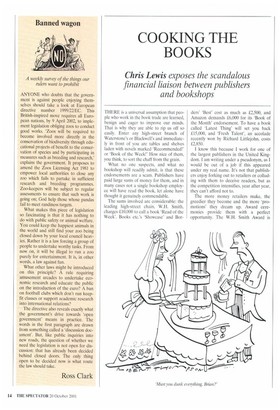A weekly survey of the things our rulers want to prohibit
ANYONE who doubts that the government is against people enjoying themselves should take a look at European directive number 1999/22/EC. This British-inspired move requires all European nations, by 9 April 2002, to implement legislation obliging zoos to conduct good works. 'Zoos will be required to become involved more directly in the conservation of biodiversity through educational projects of benefit to the conservation of species and by participating in measures such as breeding and research,' explains the government. It proposes to amend the Zoos Licensing Act 1981 to empower local authorities to close any zoo which fails to partake in sufficient research and breeding programmes. Zoo-keepers will be subject to regular assessments to ensure that such work is going on; God help those whose pandas fail to meet randiness targets.
What makes this piece of legislation so fascinating is that it has nothing to do with public safety or animal welfare. You could keep the happiest animals in the world and still find your zoo being closed down by your local council heavies. Rather it is a law forcing a group of people to undertake worthy tasks. From now on, it will be illegal to run a zoo purely for entertainment. It is, in other words, a law against fun.
What other laws might be introduced on this principle? A rule requiring amusement arcades to undertake economic research and educate the public on the introduction of the euro? A ban on football clubs which don't run keepfit classes or support academic research into international relations?
The directive also reveals exactly what the government's drive towards 'open government' means in practice. The words in the first paragraph are drawn from something called a 'discussion document'. But, like public inquiries into new roads, the question of whether we need the legislation is not open for discussion: that has already been decided behind closed doors. The only thing open to be decided now is what route the law should take.
Ross Clark


























































































 Previous page
Previous page